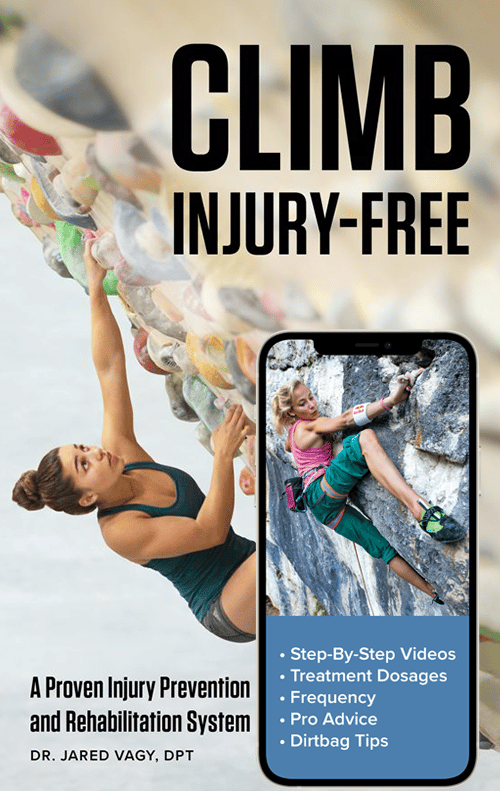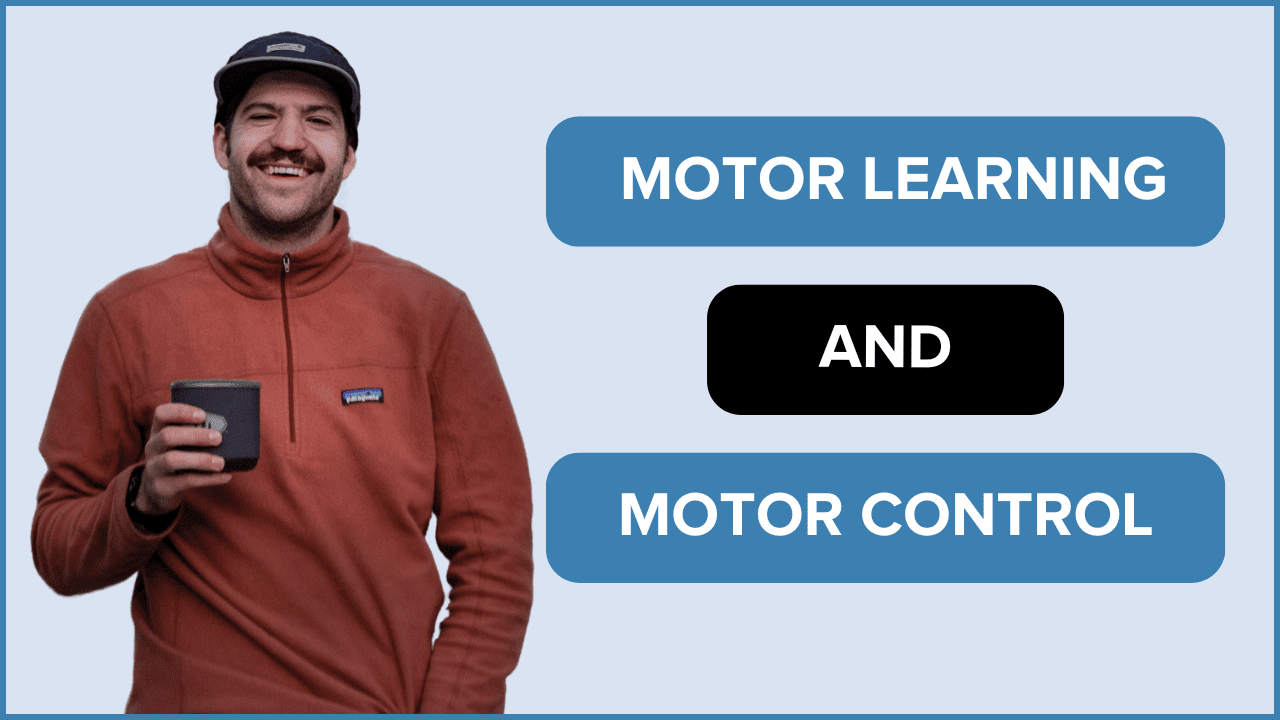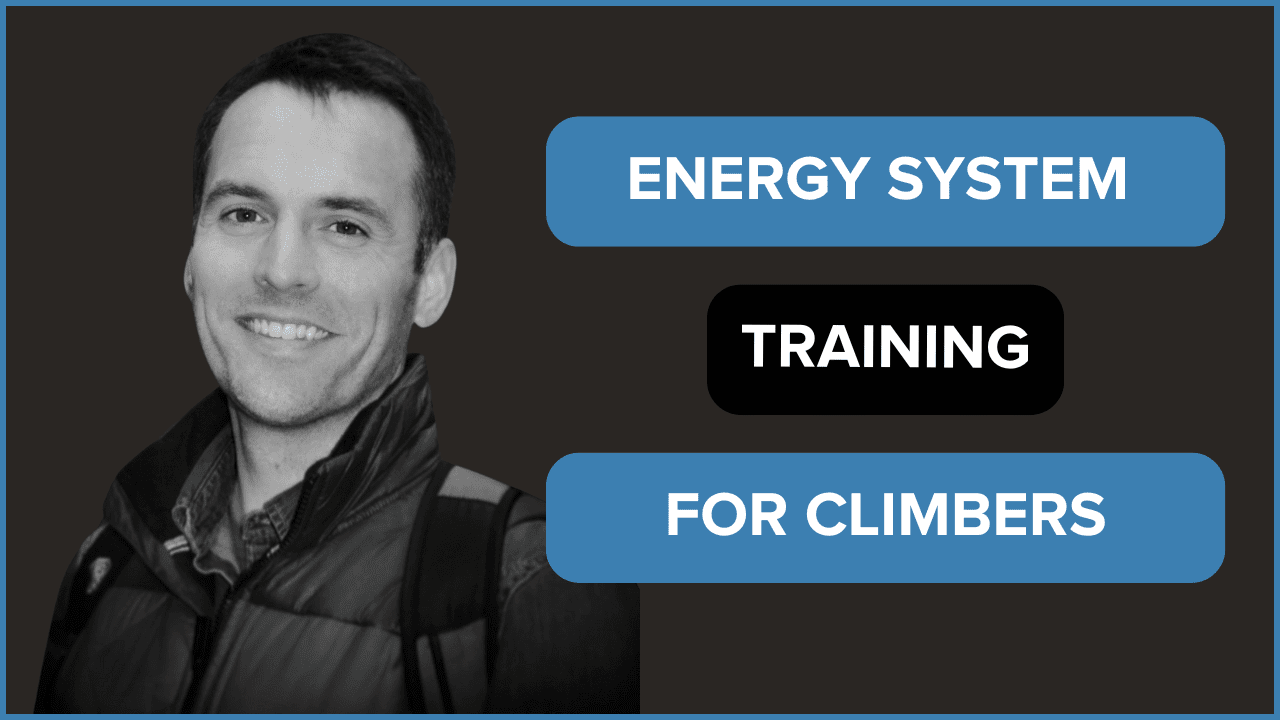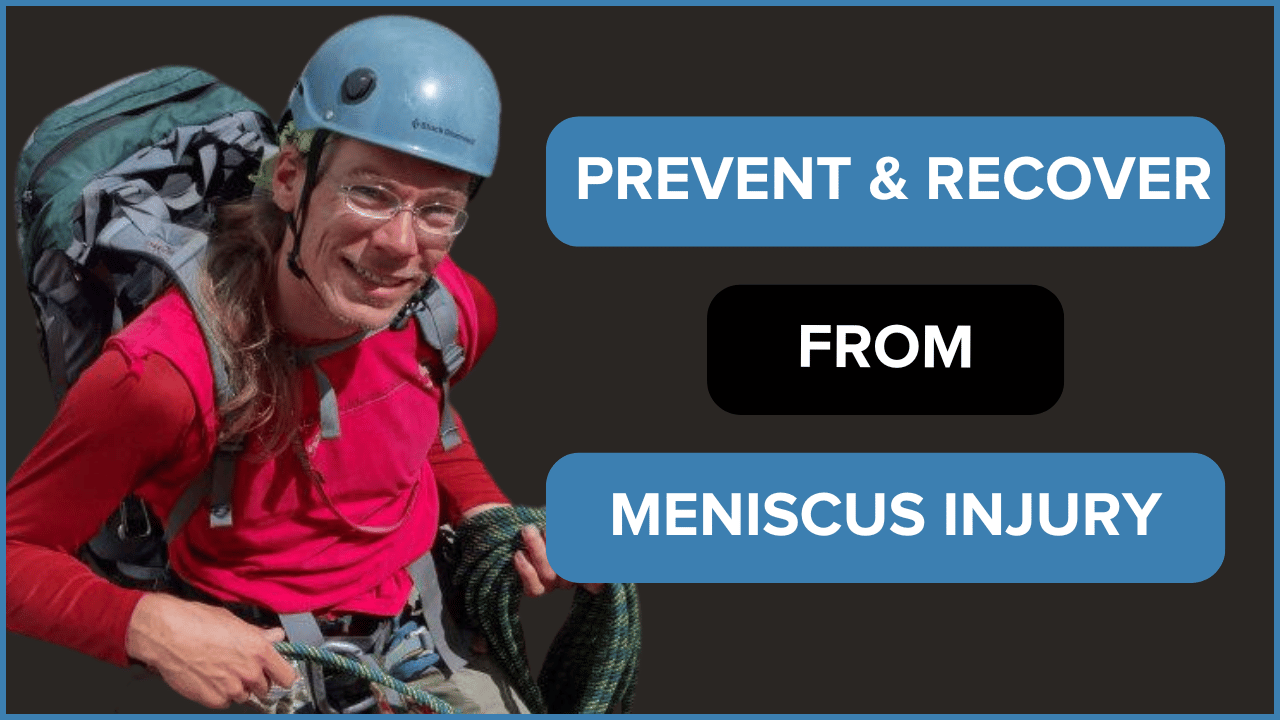S1, E2: Injury Secrets from Movement Coaching – Udo Neumann
In this episode, The Climbing Doctor interviews Udo Neumann on all topics related to climbing and injuries! Climbing since 1982, Udo has written multiple books on rock climbing, and has served in roles as both German bouldering coach and advisor to various climbing federations. Take notes, because there is a wealth of information to be had from this climbing legend!
Listen on Apple Podcasts, Spotify, or wherever you listen to podcasts!
- 0:00 Intro
- 6:45 Udo’s career as a climber, researcher, coach, and federation member
- 18:55 Udo’s take on warm up routines
- 27:22 The visual system in climbing
- 35:17 Incorporating standard rehab exercises into intention based climbing
- 52:16 Udo’s creative process for exercises and exposing climbers to novel movements
- 59:26 Udo’s tips for staying resilient in climbing
- 1:03:12 Outro and Udo’s contact info
If you would like to watch the entire interview with Udo Neumann, click the YouTube link above. If you prefer to watch sections from the interview, click the timestamps above. If you would like to read quick sample of the interview, check out the excerpt from the interview below.
Udo, tell us a little bit about yourself and just a little bit of your background because I’ve been following your work for years and I am fascinated with it. And even the style that you present is so interesting.
Yeah. I’m 58 years old and I think that’s already a part big part of the explanation of what I’ve been doing, because it just adds up, like in terms of my experience or the little experiments that I’ve been doing and experiences I have made. So there’s a lot of different stuff that fortunately tends to inform what I’m doing next. So it is actually working really nicely for me. And when I started climbing, I thought I’d been already a little bit too late because sport climbing started maybe two years, three years earlier and I was 19. So I already felt that I missed the boat.
When Was This?
It was 82 basically. And there was in the states in, I was in the states in Yosemite, in 83, for the first time and yeah, I was. But again, for me, people like John Bachar, and I would still call them sport climbers, you know, because when climbing turned into sport, they were a little bit older and I was at the beginning. I was a little bit jealous and wishing that I would’ve started earlier. But before that, before I started climbing, I was doing whitewater kayaking and like, a really power endurance sport and which I competed in. And so, I think that informs what I’m thinking now, because I was physically really fit when I started climbing, but not very, well, coordinated for what was asked for, for climbing. And so I got injured really quickly.
In those early stages?
Yea. And only, only in the early stages, you know, since I haven’t been severely injured from climbing since decades now, but and not to the point that I couldn’t climb. But at the beginning I could really quickly do a couple of one arm pull ups, but that didn’t help me. My level was only about 11A or 11B when I was doing six or seven one arm pullups.
So you had the physical strength, at least in the upper body from your training, but it just wasn’t translating?
Yeah. And I also had the mentality, I was really competitive. It wasn’t until I did a masters in sports science that I was able to put it all together with movement. And a big part of it was learning about physical education. So, I had this scientific part and the hands on part. During the program I was discovering all different types of movements and skills. I was discovered performing arts, like miming and circus arts. And I ran a circus school for a while; I was leading a program.
How was that movement introduction? Like, if you put yourself back in the moment, was it just proximity, like it was there? How did you get the fundamentals of what you do now?
It’s the sports unit in Cologne, Germany. I think still the biggest in the world. They have like 5,000 students now only for physical education sports. And so you got exposed to a lot of things. And first I just attended this class, because we were wondering where the best male-female ratio would be. And we tried it out and I instantly fell in love with it; we had this miming class and improv classes. And of course I wasn’t aware of this in real time, but later it, this still informs my, my coaching so much, and of course, as body language, like posture and all these things that I picked up on the way.
It’s interesting how these small circumstantial experiences are like: “Oh, there’s a nice ratio of females to males in this class. Let me take that.” And then you’re exposed to something that changes your philosophy.
Yeah. And it did, because when I started at the University, I was really narrow minded, you know, and totally physical abilities and physical training obsessed. Like, you would tell me how fast you run the 10k, and I would tell you if you’re a good human being. And of course I had to then go to all of these rehearsals and then I had to do dance classes, which I did really terribly in, but I wanted to stay in the performing arts program, so I had to do all this dance. Like really, these were my most out of my comfort zone experiences still. And they really shaped how I perceived human movement.
I’m just imagining this like, young, ripped, strong, rock climber, you know? And then just trying to coordinate all of these new foreign movements?
Even now it was more the kayaker at this point. And you’re wearing a helmet, you’re wearing a vest and you’re not at all used to performing in front of anybody. And I played piano for a while, but I was really nervous because same thing, finding the coordination and being nervous and a male teenager doesn’t go together too well.
Yeah. So you got to that stage of learning and undestanding movement during your studies, so how did that translate into what you’re doing now in climbing?
You are probably aware of the book Performance Rock Climbing that Dale and I wrote, and it was actually at this point when I came into writing my master thesis. I wanted to write something about cycle regulation, like psychology thing, because my girlfriend at this time did something similar too. And it was still a nice idea, but they were standing in my garden and Dale said: “ah, better write about something people are really interested in.” And so I did basically a profile of what it takes to be a successful competition climber. And these were the early competitions, so like even videotape was super advanced, you know?
So what date? Give us the timeline.
It was the end of the eighties. So: 89, 90 and then in 91, Dale and I started to write performance rock climbing, which took us three years.
And then once that book was out, did that change anything? Did that change?
Yeah. So, I mean, performance rock climbing, I think aged really well because, there’s an underlying story, or you have to your three characters that, that guide you through the book. But it was also a little bit controversial, because, I mean, I still don’t know why, but I remember one time somebody told me that Dale and I ruined climbing because we basically retook in a sense and, and explain it all with our scientific lingo, which I think is not really the case.
Another thing happened is my best friend kept on kayaking and for a decade, he became invincible in this down river racing discipline. And so I was really involved into creating his training. We brainstormed about training together, and we came up with what was now called the polarized training. So basically we skipped the entire middle part, you know, like, everything that makes you tired went. And he was just paddling really, really softly or really, really hard and our train of thought was that was an endurance sport
But I think it’s also overlooked in climbing. Often you have to make sure that you’re fit and fresh and engaged the next day and you have to think about the next day, if you want have progression in whatever you do. And with this polarized training that really helped him. So he could do huge volumes, but he was never really getting tired. And so, this was a huge self esteem boost. He was the five time world champion. And so basically invincible over this time, and of course, if you just came up with the ideas that led to this dominance now, in your kitchen of course you’re confident that you can apply it to others.
So he first became world champion in 1991. So the first year there, and I started performance work climbing, and they actually, if you read between the lines, these ideas, like with the capillarization, these things tend to go a little bit through waves, in the sense of how fashionable they are and how much people use also the lingo. And sometimes things pop up. For example, when I was in school, we learned about Rolfing and the fascial systems. And then 50 years later now I hear about fascia work like it is new idea.
It’s interesting because you’ve seen these trends; you’ve been around so long to see, as you’re mentioning: things get popular then trends die down. And it sounds like you were well aware of this process.
Yeah. I mean, there are many things we were totally wrong, you know, or as it is now. I tend to be really confident in the situation I’m in, but then looking back, I’m very often, I’m also embarrassed of things I just thought were true last week, you know
Yeah. That’s growth, right? That’s continuing to grow.
Yeah. That’s the nice word for it.
So, you put out this book, you also a case study of a kayaker doing quite well. So how does that then bridge into these next stages of what you were translating what you learned to rock climbing?
So I spent a lot of time in the states and in the early nineties, The United States is a little bit more forward thinking and a little bit less looking behind what mistakes somebody did. And even now I still enjoy working in the states. There’s also more storytelling in, in in everything I feel in the, in the Anglo-Saxons world. So I really liked it, but I was still living in Germany. And so since I was a climber, I was climbing in Germany, I became somehow this controversial figure in the German Alpine club. And it was for my history because I was already a difficult teenager when I was in the kayak club. So I was struggling with authority regardless.
You’re a rebel off the bat. That’s your personality!
Yeah, so in 2000 I did this book with Klem Loskot and it was just really hilarious, like when he first came to the Franken, people knew of him – you know – and then he just wanted to do top rope and to not get pumped for his bouldering. And then he even sat on the rope, he rested on it, Klem really liked provocation too. So, we became provocative when we were about route setting. It was so bad that the German Alpine club hosted open discussion about Neumann’s controversial philosophies. The irony is though that later they asked me to coach the German bouldering team.
Kind of comes full circle, right?
Yeah! But I think they didn’t really care. Like this was even in the late two thousands. Bouldering was still considered to not be real climbing. They were like, well, maybe you can coach bouldering or maybe this is kind of the group that you can work with. I couldn’t do any damage with the boulderers. But looking back, that was to my advantage. And so that I consider myself really lucky that with the German Alpine club, they totally left me alone. And I bargained a little bit that I could be at every world cup and traveled with the team. It was a little bit of discussion at the beginning, but once I got this, basically I could know nothing was too crazy.
Yeah. I was going say: you had permission and you had a blank palette and you got to do what you wanted, right?
Yeah, totally. And it was also nice that Juliane Wurm, the 2014 boulder world champion and Jan Hojer were really welcoming too. Now that’s also another thing in Germany. Now, for example: in USA climbing, everything is in Salt Lake, you know, and just imagine, in 20 years, the Salt Lake Guys are really arrogant about how fantastic they are. And they almost think that you must be in Salt Lake to be a really good climber or to develop as a really good climber, but then you have this scene in Albuquerque. And just the Salt Lake guys being so arrogant makes the Albuquerque guys get so much stronger. And that was totally the case for us because Cologne is in the west of Germany. It’s like in the middle and west, and Munich is in the south, really close to the Alps. So trying being not from Munich was a huge motivation to show what we could do.
So you have a little bit of rivalry?
Just a little bit. But again, a little bit of trouble making a little bit. But it worked really to our advantage. We had for a couple of years where we started to make a good overall plan. Combining training, physios, and medical, and training coaches and organizing camps. We would track progress and track route setting. And this worked really nicely for quite a while.
Where can people follow you?
Website: https://udini.com/
Instagram: @_udini_
- Disclaimer – The content here is designed for information & education purposes only and the content is not intended for medical advice.




